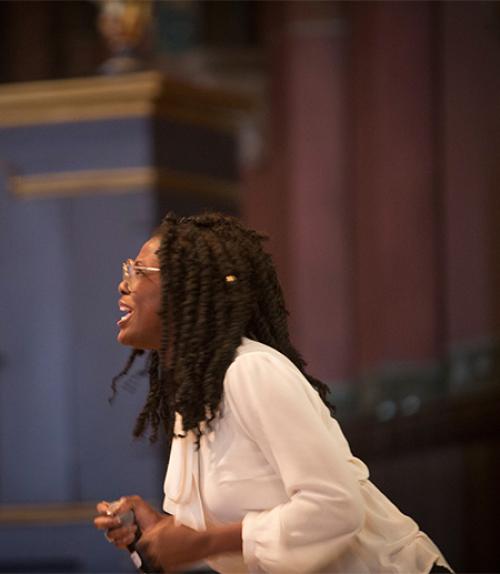“How many of you have cried today? How many of you cried yesterday? … How many of you haven’t cried in a year?”
Asking an audience of more than 100 to answer these questions by a show of hands, Enongo Lumumba-Kasongo ’08, a Cornell doctoral student in the field of science and technology studies, opened the ninth annual Soup & Hope series Jan. 21 by describing her personal journey toward authenticity. For her, that journey involved learning how to express and control her emotions – anger, pain, joy, sadness – through her art.
Growing up in Ithaca as a young black woman, Lumumba-Kasongo learned early that survival hinged on keeping emotions private and carefully guarded.
“Like so many of us, I grew up thinking that shedding tears – and particularly doing so publicly – was a sign of weakness,” she said.
After graduating from Cornell in 2008, Lumumba-Kasongo moved to Houston to serve in Teach for America. There, crying became routine for her and the other volunteer teachers, as they struggled to meet the needs of underserved kids. Lumumba-Kasongo found peace by making hip-hop beats on her computer, and eventually began to rap over these beats. She became part of Houston’s underground music scene.
After finishing her Teach for America term, Lumumba-Kasongo returned to Ithaca to study for her Ph.D., where, she said, it seemed as if she spent the whole year in tears – partly because she felt isolated, since her significant other had remained in Houston, and partly because there did not seem to be a place in Ithaca for her music career to thrive.
But she then met the friend who was to become her manager, and with his support she recorded, produced and mixed her first full-length album, which she released digitally in 2012 during her second semester as a doctoral student.
“It became a best-seller on the popular music site Bandcamp,” she said, and opportunities opened up. She frequently drove to New York City, meeting people who wanted to hear more of her work. “I was performing even more than I could’ve ever imagined while I was living in Houston.”
Through this process, she realized “being so in touch with my emotions is actually an incredible gift, a superpower that I can use to craft a performance into a liberating experience for myself and members of the audience,” she said. “It is incredibly freeing to know that I can willfully access and share the emotion that each song demands and deserves – whether it talks about a lack of representation for black women in popular media, my long and painful journey to seek therapy, or simply the process of starting over.”
To demonstrate, Lumumba-Kasongo performed a piece she had recited in July 2013 at a rally in Ithaca protesting the shooting of Trayvon Martin and the events that followed. It describes the history of being black in America, from slavery to getting “40 acres and a mule” to having a black man elected president. The refrain, like the death of Martin and many other black men and women, punctures that view of progress, and Lumumba-Kasongo let her full outrage and defiance show through:
Got your hoodie on
They want to stare at ya
They think you fully armed
Black in America
I want to turn my whole back on America
They make it hard to be black
It’s empirical x2
Lumumba-Kasongo said showing feelings needs to be done carefully. “There is definitely a case for protecting oneself,” she said. “You can’t trust everybody; you don’t know what will be done with your vulnerability in the wrong hands.”
Once you’ve found the “right hands,” Lumumba-Kasongo said, allow yourself your authenticity, “the most powerful gift you can give to yourself and to your community – particularly if your community is comprised of people who have been shown and told for centuries that their lives do not matter.”
This article originally appeared in the Cornell Chronicle.




